Signs You Need To Improve Your SEO Strategy
Does Your Website SEO Protect You?

Here Are Some Telltale Signs That Your SEO May Not Be Doing Enough
If you have a website that looks wonderful, then this is super! However, a nice looking website is of very little value to the business owner and employees if no one sees it. Here are some signs that your SEO strategy needs some upgrading or perhaps even a major overhaul.
Many businesses do not even have an SEO strategy. Therefore, if you do, then you are better than some. However, don’t compare your SEO performance to a competitor with no SEO strategy. A competitor without an SEO strategy is not worth being compared to.
In the world of search positioning, you need to be better in the niche than the competitors that are currently in the search position you want to be in. Google and the other major search engines seek out, compare, and rate the websites in a niche.
The owners of these well-positioned websites most likely do have a sound SEO strategy and consistent SEO tactics.
Here are 15 telltale signs that your SEO strategy needs to be reworked.
1. Your Organic Traffic Has Been Steadily Decreasing

You engage in SEO activities to first establish a strong position in search for phrases that bring qualified traffic to your website. The next primary reason is to then maintain that desirable position in search.
If your organic traffic is in decline, then this is a sure sign that some adjustments are required. There is an exception to this. The overall market may be in decline. Fewer and fewer people may be conducting searches for your important keyword phrases. Your SEO strategy does not mesh with the state of the market.
You must perform a market analysis. You may need to change your SEO keyword phrase focus.
Here is a graph from Google Trends on the Search Phrase “Content Marketing”. It shows 5 years of history. Note that there was a decline search volume in late 2017. Most likely websites and the content optimized for this search phrase would have also seen a decline in traffic. Then in the period from early 2018 to the present there has been a steady increase in the number of people searching using this phrase. Website traffic would therefore also increase.
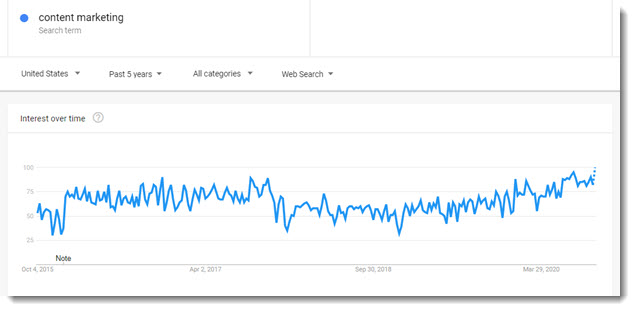
If the market is not in decline, but your organic search traffic is, then you need to see if your website is optimized considering search engine algorithm updates. Algorithm updates also relate to how a search engine may find your content, what they look for, and how they grade and position it once they find it.
Another reason why your organic traffic may be in decline could be related to your competition. Did some competitors upgrade their websites? Did one or two start blogging with the intent to take search position away from you with some well-structured blog posts? Did a new strong competitor come into your market niche?
Log into your Google Analytics account and look over your web traffic stats for the past 12 months. What does the graph display? If it is declining, then check Google Trends for keywords important to your business. A market assessment is needed if Google trends shows a declining graph. If Google Trends shows an upward-pointing graph, but your traffic graph is flat or declining, then your SEO strategy isn’t working. You may need to make an adjustment.
Start by looking for the reasons why your traffic has declined.
You may observe that competitors have moved in and taken some of the higher spots. They have pushed your website lower in the search results. This means their SEO strategy and the implementation of it is better than yours.
A fast and easy tool to use is SEO Quake, which can be helpful to provide some basic SEO analysis of your pages and those of your competition. Please make a list of the specific pages of your competitors that now rank higher than your equivalent pages and study them using SEO Quake.
To learn more about your backlinks and how you compare versus the competition, I use Majestic. This service is a top backlink analysis tool. If you cannot see a substantial difference in the on-site/on-page analysis, as displayed by SEO Quake, then your competition may be out-performing you in the area of backlinks. Backlinks are a very important part of being competitive in search.
Once you have enough information to see how to better compete then update your SEO strategy accordingly.
2. Your Organic Traffic Drops Dramatically Overnight

If you log in to Google Analytics one day and notice a significant drop in traffic over the past 24 hours, that’s another sign that your SEO strategy isn’t working.
A quick drop in traffic could mean you took an SEO shortcut to manipulate the search results. Google discovered what you were doing and adjusted (down) your position in search. This action by Google would have an immediate negative impact on your traffic.
Another reason could be that your strategy does not conform to search engine algorithm updates. When the search engines change how they discover and or rate content, and you do not keep pace, then you can see a sudden and perhaps a dramatic drop in traffic. This would correspond to a significant reduction in position for phrases essential to your traffic and business. For example, you may have gone from the first page in the search results to page two or even three. To be on page three is like being invisible in search.
A significant drop in traffic over a brief period means your SEO strategy isn’t working.
SEO position is something that needs to be done with careful thought. Good positioning does not happen overnight. Know the rules, follow a best-practice approach, and you will not be dramatically and negatively affected by search engine algorithm updates.
It’s possible, though, that a quick drop in traffic has nothing to do with a bad SEO strategy. Give your site a thorough content and SEO audit before making any major adjustments. If your site does well in the audit, look for other non-SEO-related reasons for the drop in traffic.
3. Your Keyword Rankings Are Steadily Dropping
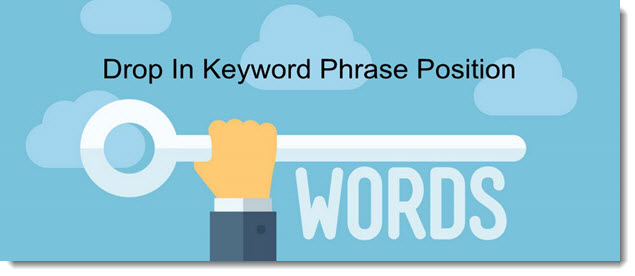
It is always wise for you to be tracking your position in search for your most crucial keyword phrases. If you find that they’re dropping over time, you’ve got a problem on your hands.
For starters, keep in mind that it’s perfectly normal for positional rank to fluctuate slightly from day to day. That’s not a problem.
You have a problem if you see a definite downward trend over time. That could mean a couple of things.
Compare your position in search with the position of your competitors for the same keyword phrases. Remember, position in search is a competition. Your key competitors could be producing content superior to yours, that’s optimized for the same keywords. Study their content. What are they doing that is notable and superior to what you are doing?
Alternatively, their content might be better optimized for the keyword. Check your content versus their content using SEO Quake and Majestic.
Make sure the keyword phrase is in the title and opening paragraph. Also, make sure it’s sprinkled throughout the content naturally. You may need to add it to an H2 or H3 tag or better optimize your image file names and image alt text.
Study your competitors for depth and variety of content associated with the same keyword phrases. Depth and variety of content attract Google and the other major search engines as this has been proven to attract us humans. Google and the other major search engines what to be sure that they are correctly displaying search results that are most attractive to humans. After all, they are providing search results and the more pleasing the results they display are the more they become the search engine of choice.
Find out what your competitors are doing to out-position you and take it to the next level in your SEO strategy. That’s how you’ll outrank them.
4. If You’re Not Ranking for the Best Keywords, Your SEO Strategy Isn’t Working
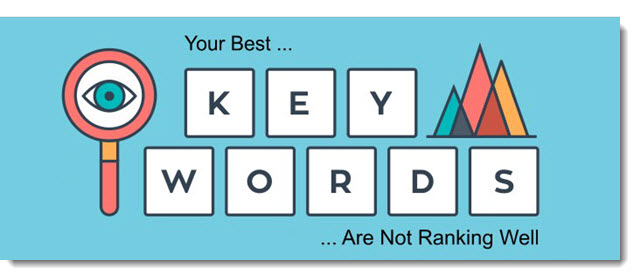
It’s probably the case that there are some keywords in your niche that are absolute winners. If you’re not ranking for those keywords, then it’s time to improve your SEO performance.
Sometimes to rank high up in search for a few key and specific keyword phrases is all a business needs to be successful. Sometimes an SEO strategy can involve 100’s of keyword phrases and sometimes, to be successful, it only takes a few. If your strategy requires you to be in a high position for only a few keyword phrases, then your better take care of business related to these few.
You need to rank towards the very top for those keywords. That’s how you’ll attract the most traffic and convince people that you’re an authority in your niche.
A #1 position in search for a specific phrase can attract 30-40% of the search volume for that phrase. The second position in search may command only 10-15% of the search volume.
The numbers drop significantly as your position drops. A 2nd-page position may result in tenths of a percent, and a 3rd-page position may produce the occasional random visitor – perhaps someone who does not really know what they are looking for. Someone searching on the 3rd page may not be part of your ideal audience.
Put in place an SEO strategy that sends your site to the very top for your most important keywords. A strong position is even more essential if your business depends on only a few keyword phrases.
5. You Have a Lifeless Conversion Rate
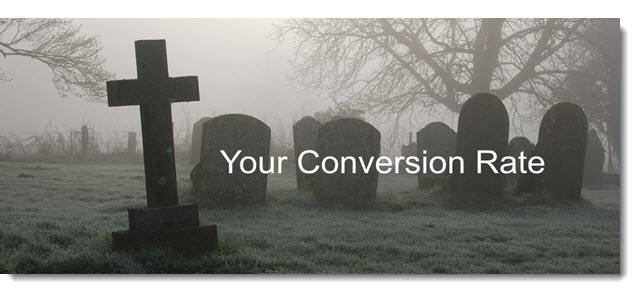
Maybe your current strategy is bringing visitors to your site, but once they get there, they’re not taking the action you want them to take.
Low-interest performance by visitors who reach your site could mean an SEO problem.
This problem may mean that your SEO strategy is not designed to bring the right kind of traffic. Your strategy is not bringing qualified traffic. Your SEO strategy is not attracting visitors who are likely to become customers.
Maybe that’s because your keywords don’t carry intent. For example, if you’re selling kitchen cabinets then your site might be optimized for “kitchen cabinets” but your content does not help the searcher solve a problem. Perhaps your search engine optimization does not relate strongly enough to a purchase intent.
In that case, consider optimizing for keywords like “discount kitchen cabinets” or “kitchen cabinets on sale” or “easy-installation kitchen cabinets”. To optimize in this manner may bring in visitors who want to buy kitchen cabinets.
Use your keyword tracking tools and look at the most popular keywords attracting people to your site. Ask yourself: are these the keywords my potential customers – people who will make a purchase – use in online searches?
If not, update your strategy.
6. Your SEO Strategy Isn’t Working if You’re Using Thin Content

I have seen many website owners who produce page content or a blog post in the 100-150 word range and then complain that it does not rank well in search. Of course, if this is the only content available on the topic, then perhaps it will. However, if there is any competition of significance, then don’t be surprised if your thin and weak content does not end up at the top of the first page.
Why would a search engine present thin or weak content at the top of its first page? It makes them look bad and untrustworthy as a search engine. Do you think that Google wants to appear to be untrustworthy?
You’re not going to achieve a prominent position in search against worthy competition with an SEO strategy that results in thin or weak content.
Google and the other major search engines focus on the user experience. That means it will rank the most helpful articles – with in-depth rich content – towards the top of the search results.
Those articles are usually long and have depth and variety of content.
If your competition is producing 500-word articles, can you produce worthy content on the same topic that is 1000 words? If your competition provides 1 or 2 images and or graphics in their 500-word article can you offer more insight and make it more valuable for the reader with 4-5 graphics in your 1000-word article. If your competition has nice video content and you do not, then you will be at a disadvantage.
Make your content 2-3 times better than anything else out there to command an elevated position in search.
Aim for competition-beating content, and Google will reward you with a better rank.
7. You Have a High Bounce Rate
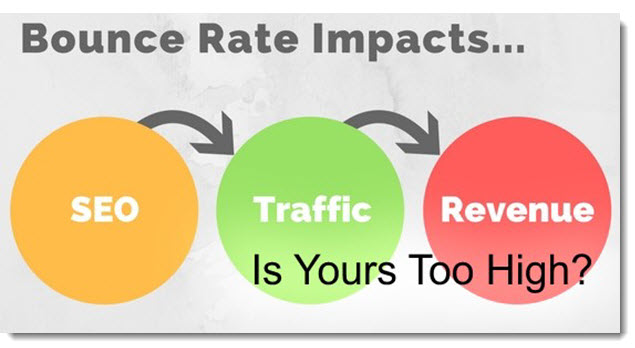
Head over to Google Analytics and check your page metrics. If you find that your bounce rate is unusually high, you need to rethink and adjust your SEO strategy.
A high bounce rate is very undesirable and negatively affects your position in search.
If Google sees that visitors to your site leave quickly after arriving, then Google may conclude that your content is not pleasing to your visitors. If Google concludes that your content is not pleasing, then why should it display your content high in its search results – your content is making it look bad. The last thing Google wants to do is to look bad to its customers.
The bounce rate is a key performance metric that you need to track. It is a metric that shows the percentage of visitors who leave your site after looking at only one page.
You want your bounce rate number to be low.
That’s especially true of landing pages that are designed to make your website “sticky”. Those are the pages that bring people in so they can browse around for a bit and learn more about your products or services.
Fortunately, there are plenty of ways to reduce your bounce rate. Be willing to conduct experiments to determine what people like and what they do not like to improve your bounce rate.
8. If You Have a Low Time-On-Site, Your SEO Strategy Isn’t Working
This one is related to the previous point on bounce rate. Once again, you can find the time-on-site in Google Analytics.
If your visitors leave your site after only a few seconds, you’re not connecting with them. Your content is not worthy, or you are attracting the wrong audience.
Make sure that your titles and your snippets in the search results properly advertise the content on your page. Your ideal audience will leave your site quickly if these key SEO elements are not properly optimized for your ideal audience.
9. You Have Too Many Low-Quality Backlinks

An essential part of any SEO effort is developing a healthy backlink profile. That means getting links from quality relevant websites.
Getting links from sites with a very low domain authority (DA) means that this part of your SEO strategy isn’t optimized. If your backlink SEO strategy is very poorly done, then you could even be penalized and see a drop in search position even if your on-page/on-site SEO strategy is well done.
Fix the problem by disavowing the spammy links and acquire links from high-quality relevant sites.
10. Your SEO Strategy Isn’t Properly Focused if Search Position is Your Only Target

Focus on helping people. Focus on adding value to your ideal audience.
Get your priorities right. You shouldn’t produce content for search engines. You should produce content for people.
Then, when you’ve created content that people love, Google and the other major search engines will reward you with a high position.
The search engines – led by Google – are all about user experience. If you’ve got content that will delight your ideal audience, then you can feel confident that it will rank well.
11. You’re Using the Same SEO Strategy From 4 Years Ago
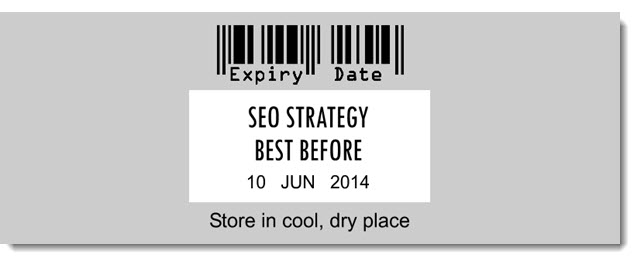
The only constant is change. You can be sure that’s the case with SEO.
If you’re using a strategy that worked spectacularly in 2012 or 2014, that doesn’t mean it’s going to work now. SEO has evolved quite a bit since then.
You need to keep up with the latest best practices. Bookmark sites like Search Engine Land and Search Engine Watch so that you stay informed. If your competitors are staying current and you are not, then you can expect to see your position in search drop versus your competition.
Stay informed on algorithm updates and read tips from other SEO professionals. Update your own strategy accordingly.
12. You’re Expecting Quick Results
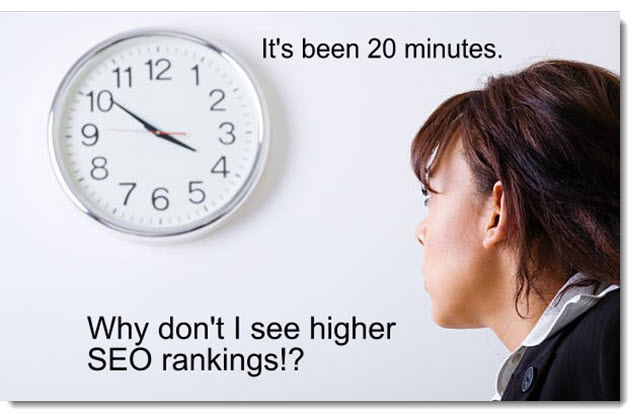
When you get into SEO, you need to be in it for the long haul. There is no “quick fix” initiative.
If you’re expecting instantaneous results from some winning SEO strategy you picked up from some SEO expert yesterday, you’re going to be sorely disappointed.
A well-designed and implemented SEO strategy can take six months to a year before it starts to pay off with a higher search position and more qualified traffic.
If you achieve satisfactory results faster than that, give your SEO consultant a bonus and smile. However, don’t get discouraged if you don’t.
13. Your SEO Strategy Won’t Work if You Have No Content Plan

What’s the topic focus of the articles that will be produced this month?
If you can’t answer that, you likely don’t have a content plan. Your content plan is a vital part of your SEO strategy.
Make it a point, soon, to do some keyword phrase research. Include longtail keyword phrases. Select a few (20-30), which will be important to your business.
Then, create an article topic and title around each keyword phrase. Put each title on your content plan.
Your content plan will provide some clear direction and help you to achieve audience-attracting results.
14. Your SEO Strategy Won’t Work if You’ve Gone Cheap on SEO
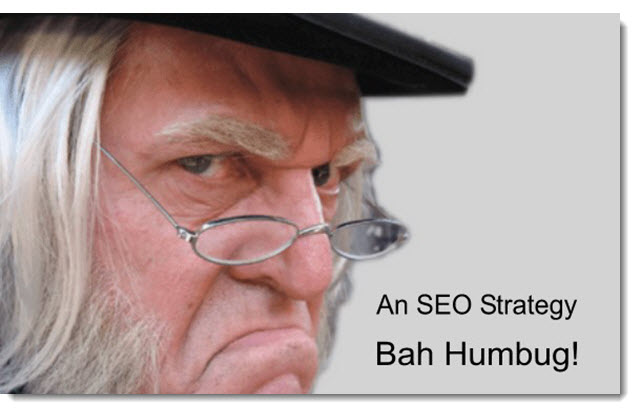
You might have interviewed several different SEO agencies and picked the one that was the cheapest. That makes sense from a cash spend perspective. However, does it make sense from an SEO perspective related to building your business by attracting your ideal audience?
SEO performance needs to be factored into your marketing budget and not based on the lowest-cost bidder. Instead of picking the least expensive agency, you should probably have chosen one that checks off the following:
- They are comfortable with your business and your ideal audience.
- You feel comfortable with them.
- They have achieved an advantageous position for their website.
- They have excellent Google reviews.
This selection may mean that they are not the cheapest but rather may be more towards the expensive side. The value they create will be greater than the low-cost competitor.
Moreover, the long-term value will be greater, and if you are in it for the long haul, this makes sense for your business.
A proper SEO budget is a cost of doing business these days.
15. You Have No Goals

One sign that your SEO strategy isn’t working is if you can’t tell that it’s working. That is, you have no goals.
If that’s the case, start coming up with goals today.
You have several different option goals with SEO:
- Increased traffic
- Lower bounce rate and longer time-on-site
- Improve brand-name awareness
- More authority as people perceive authority with a high position in search
Think about why you want a strong presence in the search results. Then, you’ll be in a better position to determine if your SEO strategy is working.
SEO Strategy Summary
This list of 15 items could be indicators that your SEO strategy is not working well. Perhaps, you have more than one sign that things are not working as well as they could be. If so, determine what kinds of changes you need to make. Get some help if you need it. Performance in search has technical aspects to it and content marketing – content creation aspects.
Establish clear and easy to measure goals. Evaluate your new strategy after six months. Make additional changes as necessary. It is a constant exercise in measuring performance to goals and objectives and then adjusting and measuring again. This is just like any other aspect of your business.
You may also be interested in my step-by-step Content Marketing Tutorial Series. A great deal of SEO performance has to do with content.
